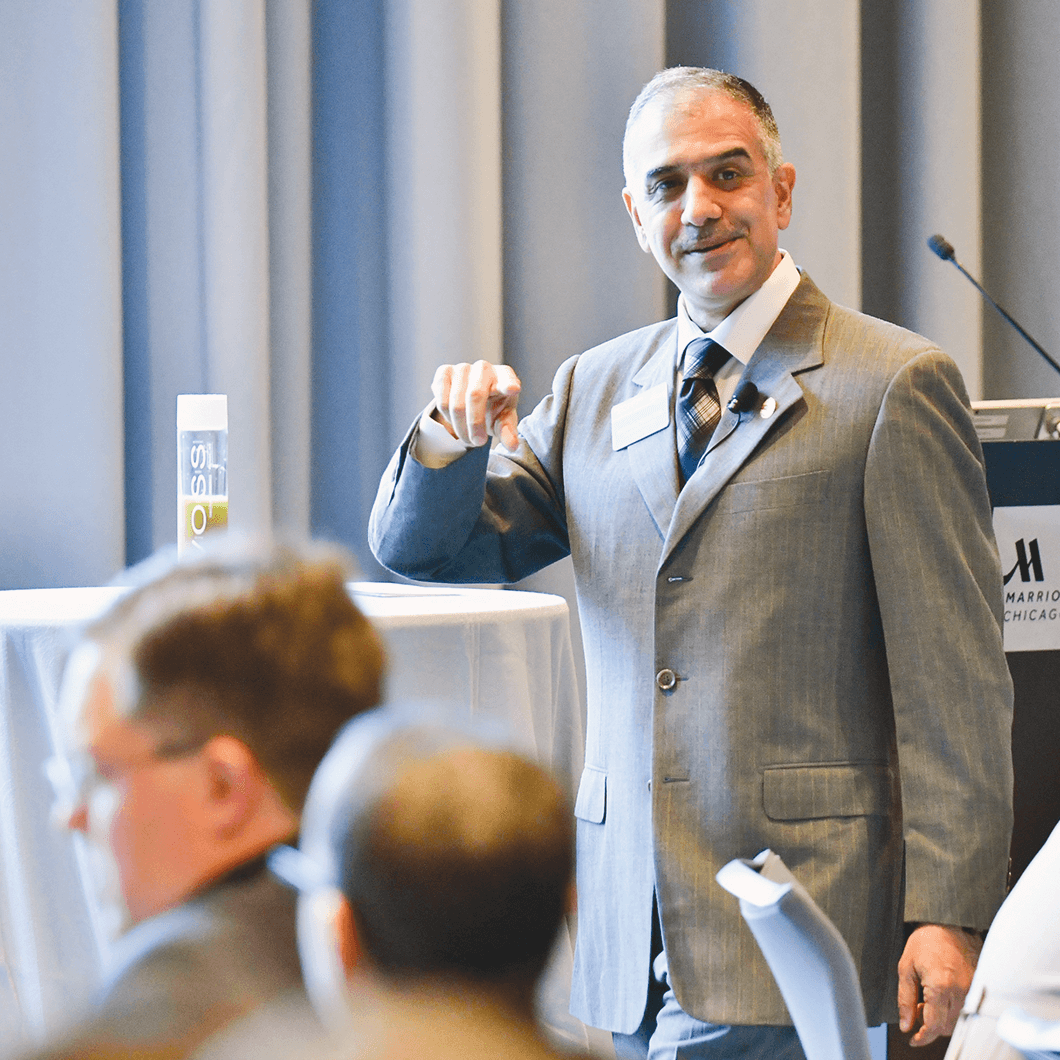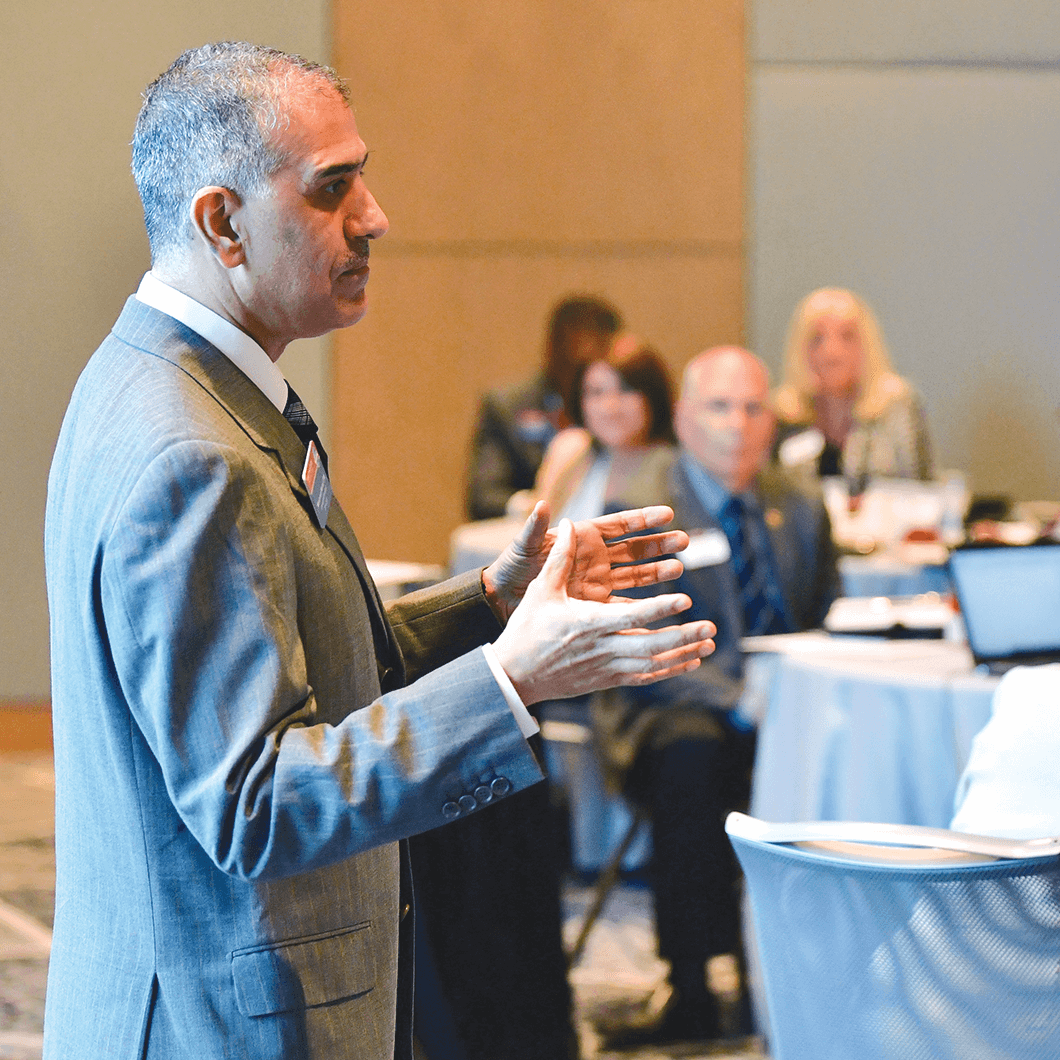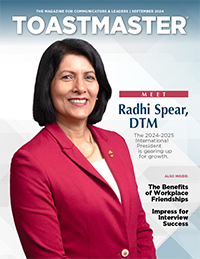
Click play to hear an interview with Mohammed Murad and Greg Gazin, host of the ToastCaster-Communication, Leadership & Learning Lab podcast.
Have you ever asked yourself if becoming a leader is a viable solution to your life challenges?
As a Toastmaster, this question might be prompted if you are asked to serve as an area or district officer. Giving it a little more thought, you might realize this same question already came up, indirectly, when you considered whether or not to join Toastmasters.
One question we ask ourselves daily—that may not seem like contemplating leadership directly—is, How will my day be? This could mean different things to different people, but ideally, as a potential leader, your question would be more like: How will I succeed in everything I do today?
When we analyze leadership in detail, it’s clear that leadership is demonstrated in the smallest tasks—small successes are precursors to big successes. Our capabilities and perspective on leadership will greatly affect our acceptance of the fact that we are all leaders, and that leadership starts with self-leadership. Great leaders last because they lead themselves first.
This brings us to the crucial question: What does it take to become an outstanding leader? We need to emphasize the word outstanding, because it is what we must aspire to become.
In my mind, outstanding leadership is based on the “Five H’s.” I invite you to test my theory and consider these characteristics in leaders whom you admire. I have no doubt the five traits will be apparent in each one.
1 Head:
The brain is fascinating when it comes to learning. We can learn, unlearn and build on the knowledge we have acquired to make better decisions. Nurturing the brain—the head—through continual learning is the first trait of an outstanding leader.
For example, Steve Jobs attended a college calligraphy class to learn about typefaces, and that knowledge eventually inspired the beautiful typography of Apple machines. It’s never too late to learn: Leo Plass, the world’s oldest college graduate, earned his degree at 99 years old.
When we stop learning, our brains start deteriorating, as do our leadership capabilities. The “head” in leadership entails a relentless thirst for knowledge, not only in our field of specialization but the peripheries as well. Sometimes, seeking knowledge in a completely unfamiliar field gives us that “aha” moment we have been waiting for.
Biologically, within the head we have the inner ear, which helps us maintain balance in our movement. Similarly, leadership requires balance, not only in gaining knowledge but also in being levelheaded in decision-making. Balance helps us carefully weigh possible outcomes or consequences of decisions we make.
2 Heart:
Alan Watts, a British- American philosopher, once said, “The only way to make sense out of change is to plunge into it, move with it and join the dance.”
It takes a strong heart to take risks and join the dance. Yet risks that are fortified with knowledge and balance from the head become calculated risks.

For example, Mahatma Gandhi took a huge risk when deciding to lead India’s non-violent protests against British rule. His heart was drawn to leading change, yet he wasn’t acting impulsively. His actions were based on the knowledge he gained while studying law in England, along with his experience during apartheid in South Africa. His knowledge, coupled with his legal background, turned his calculated risk into one of the greatest leadership journeys in history—one that led India to independence and inspired peaceful protest and civil rights movements for years to come.
“Outstanding leaders treat everyone else as if they are also leaders—or leaders waiting to emerge.”
In addition to his passion and knowledge, Gandhi used another aspect of the heart: empathy. He cared greatly for those he wanted to help. Taking a risk and focusing purely on goals, without regard to people, deprives leaders of a crucial element—loyal followers, who believe in the goal and in the leader.
3 Health:
Health is often neglected by some leaders, who think they lack the time to tend to their own well-being. It is flawed thinking to believe that achieving goals is the utmost priority without considering how both the head and the heart will weaken without physical and mental health.
Those who preach about leadership with little or no mention of health may look at leadership from a narrow perspective rather than holistically. A holistic approach needs to include the three main elements of attaining physical health: nutrition, exercise and sleep. Through exercise, the heart muscle will be fortified for physical strength.
As for the “head’s” role in wellness, mental health is crucial for attaining clear and focused thinking. This is aided by memory-enhancement exercises, by clearing the brain from clutter through meditation and relaxation, and by widening one’s perspective through visualization and self-affirmation.
It is important to understand that health is a lifestyle, a habit and a lifelong practice.
4 Humility:
Successful leadership will only be attained if followers feel genuinely appreciated and treated with respect. That achievement begins with respect for oneself. Once that is accomplished, respect for others becomes an automatic progression.
Only humble leaders can be generous in giving due credit to whomever deserves it.
Humility requires being a good listener, a trait that conveys a person is caring and is comfortable putting other people first. Leadership begets more leaders. Outstanding leaders treat everyone else as if they are also leaders—or leaders waiting to emerge.
Humility is often confused with passivity or meekness. This is not true. A leader can be humble but also aggressive in achieving goals and taking risks.
5 Happiness:
We have many reasons for wanting to better lead ourselves or others, but the true and ultimate reason to lead is to achieve happiness. In psychologist Abraham Maslow’s famed hierarchy of needs, the highest goal is self-actualization, which is a sense of well-being, or happiness. Every one of us has leadership within. To find that leader, all we must do is remove our self-doubt—along with the tendency to doubt others—and be confident.
We all have heads and hearts; we can certainly develop a healthy lifestyle and learn that humility is a form of understanding other people. But to answer the complex question, Is leadership for me? ask yourself the simpler question: Do I need to be happy?
My answer, and I presume any sane person’s answer, is, “Yes.” After all, who doesn’t want to be happy?
Mohammed Murad, DTM of Dubai, United Arab Emirates, served as Toastmasters International President in 2014–2015. A retired senior police officer, he holds several academic degrees and has more than 28 years of experience at the director and chief executive officer levels in emergency medical services management, human resource development and strategic planning for organizations.


 Previous
Previous
 Previous Article
Previous Article

